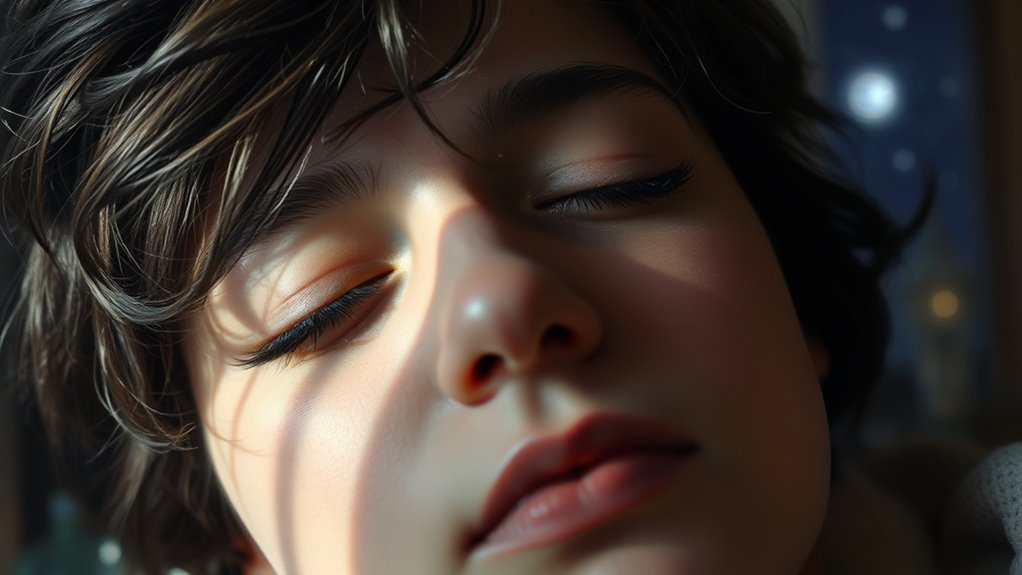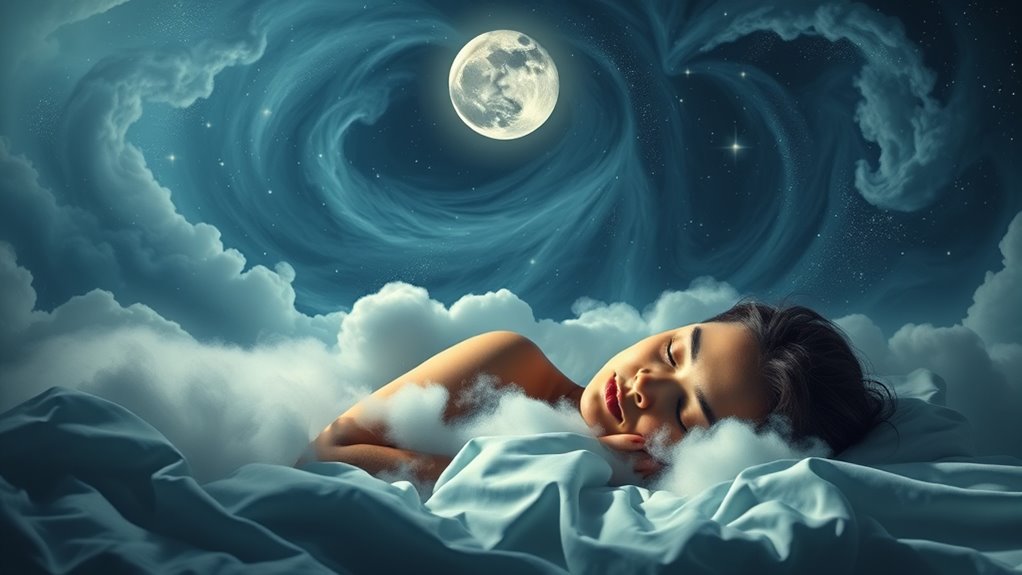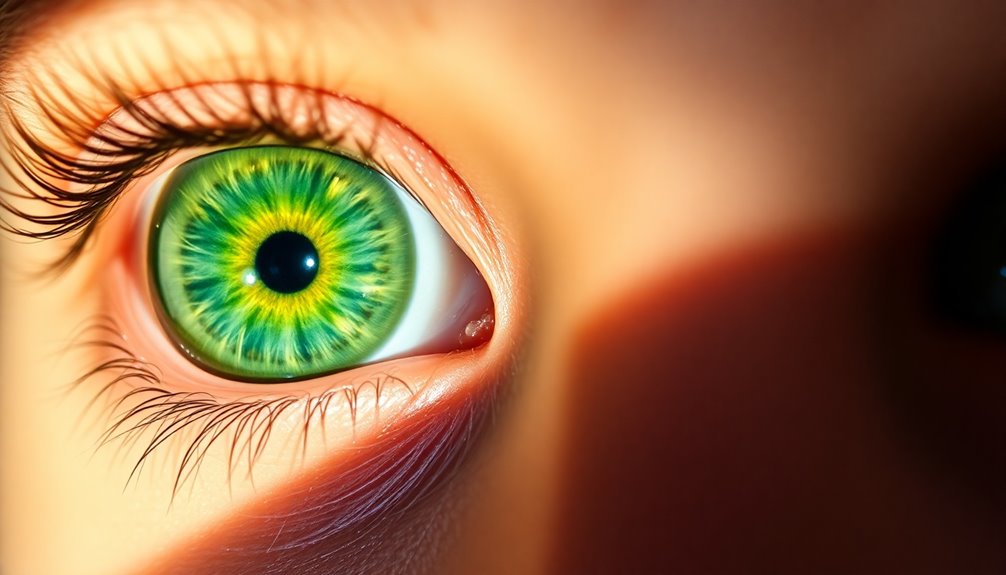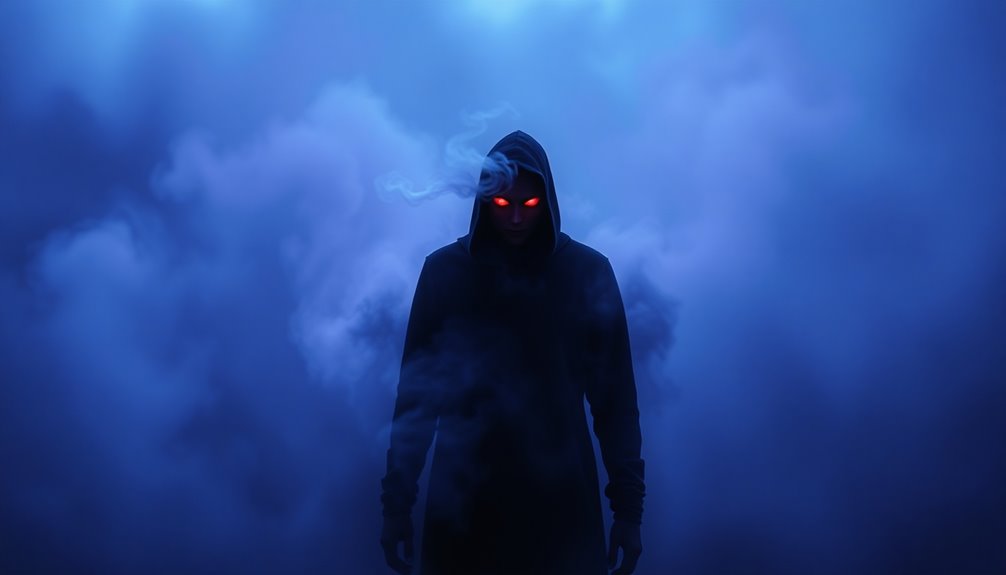Feeling like you’re falling from the sky in your sleep is a common experience caused by natural brain processes during dreams or sleep shifts. It often happens during lucid dreaming or sleep paralysis, when your brain creates vivid sensations like slipping or plummeting. These feelings are harmless but can startle you. Understanding that it’s a normal part of sleep might help ease your concern—if you want to explore why this happens, there’s more to discover below.
Key Takeaways
- The sensation of falling from the sky during sleep often results from vivid dreams or hallucinations in sleep paralysis.
- These feelings are caused by misfiring of the brain’s perception mechanisms during transitions between sleep stages.
- Falling sensations are common in lucid dreaming, where awareness of dreaming can trigger the feeling of slipping or plummeting.
- Such experiences are harmless and part of normal sleep phenomena, not signs of health issues.
- Understanding these processes can help reduce fear and make these startling sensations more manageable.

Many people experience the unsettling sensation of falling from the sky while they sleep, often waking up suddenly with a jolt. This common phenomenon can feel so vivid that it leaves you wondering whether it’s a nightmare or something more mysterious. Scientists have studied these sensations extensively, and they’ve found that they often relate to a mix of sleep states, like lucid dreaming and sleep paralysis, which can create these intense but harmless experiences.
Many people feel like they’re falling during sleep, caused by lucid dreaming and sleep paralysis.
Lucid dreaming is a state where you’re aware that you’re dreaming while still inside the dream. During these moments, you might notice the sensation of falling or feel the urge to wake up suddenly. Sometimes, during lucid dreams, your brain creates vivid scenarios—like slipping off a cliff or plummeting from the sky—that seem real. This can trigger a reflexive waking response, making you jolt awake just as you’re about to hit the ground. While lucid dreaming itself is generally safe and controlled, the sensations of falling can sometimes be mistaken for more distressing events, especially if you’re new to the experience.
Sleep paralysis, on the other hand, plays a significant role in many fall-related sensations. It occurs when your body temporarily paralyzes itself during the shift between sleep and wakefulness, often during REM sleep. During sleep paralysis, your mind might be awake and alert, but your muscles remain immobile. As your brain wakes up, you may experience hallucinations or a sense of weightlessness, which can include the feeling of falling from a great height. This combination of paralysis and vivid hallucinations can intensify the sensation, making it feel terrifying even though it’s a natural part of the sleep cycle. Researchers have also identified that these experiences are linked to sleep transitions, highlighting the brain’s complex processes during sleep.
Both lucid dreaming and sleep paralysis illustrate how your brain constructs these sensations during different sleep states. The feeling of falling is a kind of misfire in your brain’s perception, often linked to the transition phases of sleep. It’s not a sign of something physically wrong; instead, it’s your mind’s way of processing dream imagery or crossing the boundary between wakefulness and sleep. Understanding these phenomena can help you realize that these experiences are common and harmless, even if they’re startling. Next time you wake up feeling like you’re falling from the sky, remember that your brain is simply doing its job—creating vivid, sometimes confusing sensations during the complex dance of sleep.
Frequently Asked Questions
Can Falling Dreams Predict Future Accidents?
Falling dreams don’t predict future accidents, but they can reveal your subconscious fears or stress. During lucid dreaming, you’re aware you’re dreaming and can sometimes control these sensations, while sleep paralysis makes you feel like you’re falling without moving. These experiences reflect your mind’s processing of emotions, not actual danger. So, don’t worry—falling dreams are normal and don’t forecast real-life accidents, even if they feel vivid.
Why Do Some People Never Experience Falling Sensations?
You might wonder why some people never experience falling sensations during sleep. It’s not about luck; factors like lucid dreaming and sleep paralysis influence this. If you rarely remember vivid dreams or experience sleep paralysis, you’re less likely to feel falling. Your brain’s unique sleep patterns shape this. So, even if you haven’t felt it, you’re still exploring the fascinating ways your mind navigates dreams and consciousness.
Are Falling Dreams Linked to Specific Mental Health Conditions?
You might wonder if falling dreams relate to mental health conditions. These dreams can be linked to nightmare triggers like stress, anxiety, or trauma. Sleep paralysis, often causing frightening sensations, can also make you feel like you’re falling. While not always a sign of a mental health issue, frequent falling dreams may signal underlying stress or anxiety that’s worth addressing for better sleep and emotional well-being.
How Do Age and Lifestyle Affect Falling Dream Frequency?
Imagine your dreams are like a river, flowing differently as you age. As you grow older, your sleep patterns shift, making falling dreams more frequent or rare. Lifestyle choices, like stress or exercise, shape this flow, influencing how often you experience these dreams. Age-related changes in sleep quality and duration can make you more prone to vivid, sometimes unsettling, falling sensations, turning your nightly journey into a turbulent voyage.
Can Falling Dreams Be Intentionally Triggered or Controlled?
You can intentionally trigger or control falling dreams through lucid dreaming and dream control techniques. By practicing reality checks and maintaining awareness during sleep, you become conscious within your dreams. This awareness allows you to intentionally induce falling sensations or other dream scenarios. With consistent practice, you’ll gain better control over your dreams, making it possible to experience falling on command and explore your subconscious in a more deliberate way.
Conclusion
So, next time you wake up feeling like you’ve fallen from the sky, remember—it’s just your mind’s wildest stunt. Your brain’s trying to keep you on your toes, turning a tiny sensation into a full-blown skydiving adventure. It’s like experiencing an earthquake in your pillow or a rollercoaster inside your head! Crazy, right? But now, you know it’s just your brain throwing a sleep-time fireworks show, not an actual fall from the heavens.











